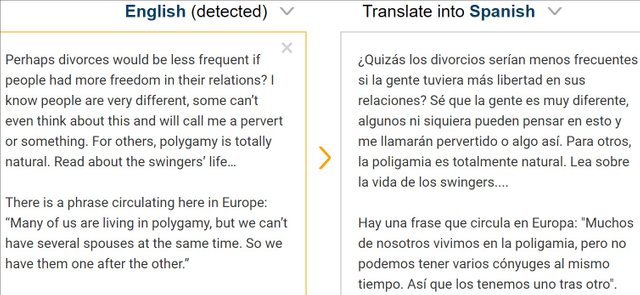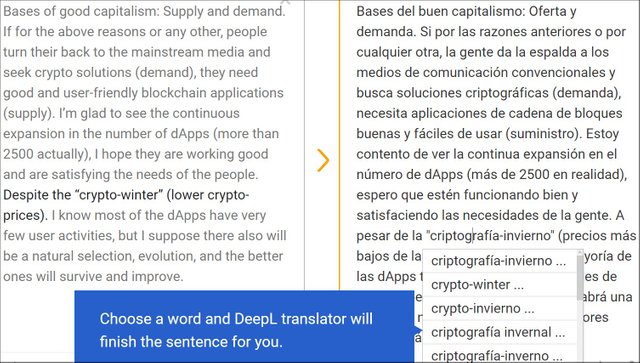¿Estás viviendo de traducciones? ¡Cambia de profesión! (ESP/ENG)

Hace unos diez-doce años era una cosa muy chistosa escribir frases o palabras difíciles en el traductor de Google, Translate, porque en una gran parte de los casos salió alguna tontería. Los resultados al principio eran muy malos. “El Traductor de Google no traduce directamente de un idioma a otro. En cambio, a menudo traduce primero del idioma fuente al inglés y luego del inglés a la lengua de destino” – escribe Wikipedia.
Errores múltiples
Pero como el significado de las frases o palabras depende del contexto, este método duplica también los errores de traducción. Aún peor el caso de algunos idiomas dónde ni el inglés es suficiente, se aplica un idioma intermediario más. Por ejemplo el ucraniano primero traducen al ruso y después el ruso al inglés… ¿Triple cantidad de errores? ¿O nueve veces más porque se multiplicarán cuadráticamente?
Pero no estoy escribiendo ahora para menospreciar este servicio, al contrario. En los últimos meses me doy cuenta que los resultados se están mejorando considerablemente. De español al inglés y viceversa – dónde no se entremete ningún otro idioma – tengo buenas experiencias con Google. Pero aún mejores con un servicio relativamente nuevo. Esta página supuestamente usa otro método diferente de lo que Google. “Redes neurales”, “araña web” según Wikipedia – no entiendo cómo lo hacen pero Deepl.com parece mejor.
Veamos un ejemplo. He elegido un par de frases de uno de mis últimos posts en inglés: “Cómo evitar la plaga llamada divorcio?”. Son frases cotidianas, lo sé, no muy complicadas, pero la traducción me parece perfecta y no tocaría ni una palabra en ella:

Pero mejor intentémoslo con otro texto más difícil también. Tengo un artículo sobre criptodivisas y aplicaciones de cadena de bloques (5 Buenas noticias para los inversores de criptos que realmente importan). ¿Puede traducir la máquina este texto bien?

Bastante bien, según mi opinión. Hay un problema con un comienzo de frase, y yo cambiaría tres palabras. (Suministro ==> oferta, realidad ==> actualidad, criptografía ==> criptodivisa.) Pero no está mal. Y el programa mismo está ofreciendo alternativas, lo que facilita mucho el trabajo. (Hay momentos chistosos todavía, cuando por ejemplo ofrece la palabra cripta para sustituir “crypto”… ¿Tú, cuántas criptas tienes?)
Pececito en tu oreja
Pues si yo estuviera viviendo de traducciones seguro que cambiaría de profesión, rápido. Si siguen así, dentro de un par de años llegaremos al mundo de ciencia ficción, o lo que era ficción antes: Las máquinas que están traduciendo simultáneamente lo que dices o escuchas. Una pequeña maquinita en tu oreja como “el pez de Babel” en el libro Guía del autoestopista galáctico y todos los problemas relacionados a los idiomas resueltos. ¿O no?
Casi se me olvida. Falta otra prueba, traducir del español al inglés. ¿Que si pongo este mismo texto como prueba? A ver cuánto hay que corregir en la traducción. Según mi cálculo no mucho, sólo 8-10 palabras.

(English version, raw traduction with DeepL.com, without later corrections to test the translator.)
Are you living on translations? Change your profession! (ESP/ENG)
About ten-twelve years ago it was a very funny thing to write difficult phrases or words in the Google translator, Translate, because in a large part of the cases some nonsense came out. The results at first were very bad. "The Google Translator does not translate directly from one language to another. Instead, he often translates first from the source language into English and then from English into the target language" - he writes Wikipedia.
Multiple errors
But since the meaning of phrases or words depends on the context, this method also duplicates translation errors. Even worse is the case of some languages where even English is not enough, one more intermediate language is applied. For example, Ukrainians first translate into Russian and then Russian into English... Triple the number of errors? Or nine times more because they will multiply quadratically?
But I'm not writing now to belittle this service, on the contrary. In the last few months I realize that the results are improving considerably. From Spanish to English and vice versa - where no other language is involved - I have good experiences with Google. But even better with a relatively new service. This page supposedly uses a different method than Google. "Neural networks", "web spider" according to Wikipedia - I don't understand how they do it but Deepl.com seems better.
Let's look at an example. I have chosen a couple of phrases from one of my last posts in English: "How to avoid the plague called divorce?". They are everyday phrases, I know, not very complicated, but the translation seems perfect to me and I wouldn't touch a word in it:
Picture 1
But let's try another, more difficult text as well. I have an article on crypto currency and block chain applications (5 Good news for crypt investors who really matter). Can the machine translate this text well?
Picture 2
Quite well, in my opinion. There is a problem with a sentence beginning, and I would change three words. (Supply ==> offer, reality ==> actuality, cryptography ==> cryptodivisa.) But not bad. And the program itself is offering alternatives, which makes the work much easier. (There are still funny moments, when for example it offers the word crypt to replace "crypto"... You, how many crypts do you have?)
Little fish in your ear
Well, if I were living on translations, I'd change professions quickly. If they continue like this, in a couple of years we will reach the world of science fiction, or what was fiction before: The machines that are simultaneously translating what you say or hear. A little machine in your ear like "the fish of Babel" in the book Galactic Hitchhiker's Guide and all the problems related to the languages solved. Or not?
I almost forgot. Another proof is missing, to translate from Spanish to English. What if I put this same text as proof? Let's see how much to correct in the translation. According to my calculation not much, only 8-10 words.
(Cover photo: Pixabay.com)
interesante post. steemit me ha vuelto lector nuevamente. :)
hola excelelte dame tu voto
interesante saber esto
Excelente post! :)
Buena información @madia24. saludos...
Repollo es un proyecto que tiene como misión entregar recompensas a todos los creadores de contenido. Tú puedes recibir un voto de Repollo siempre si decides adquirir una membresía delegando desde 50 SP. @cervantes apoya a Repollo, Puedes votar por ellos como Witness aquí. No te olvides de seguir promocionando tus publicaciones en nuestro Discord.